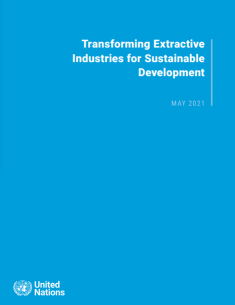
Historically, extractive industries have also been a major driver of economic growth, particularly for now-advanced economies that benefitted during and after the Industrial Revolution. Currently, mineral resource extraction plays a dominant role in the economies of 81 countries that account for a quarter of global GDP, half of the world’s population and nearly 70 per cent of those living in extreme poverty. The COVID-19 pandemic caused an extraordinary socioeconomic crisis throughout the world, resulting in a 4.3 per cent contraction of world GDP, the first increase in extreme poverty since 1998, and the loss of the equivalent of 255 million full-time jobs relative to the level in 2019. As our world moves toward an uneven and partial recovery, failure to transition to more sustainable systems will generate stranded assets, perpetuate vulnerabilities, jeopardize the fight against climate change and threaten human well-being, ecosystems, and economies for decades, if not centuries, to come. Transforming extractive industries must be part of the solution. This will require giving equal weight to the management of the impact of extractives on societies and the environment, as has been given to economic considerations in the past. A shift in mindset is also needed away from short-term economic considerations to long-term financial risks and broader-based benefits associated with the transition to net-zero economies, that include social, environmental and cultural externalities.

